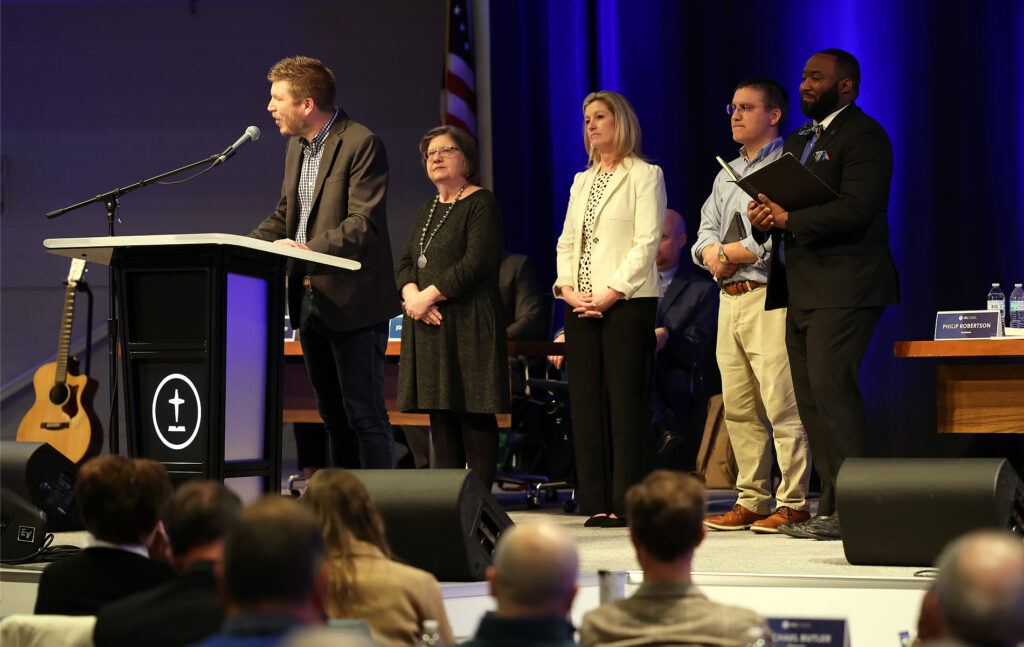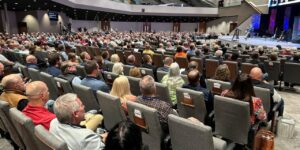
NASHVILLE (BP) — A soon-to-be launched independent non-profit organization will be devoted to helping Southern Baptist churches and entities prevent and respond to sexual abuse.
The Abuse Response Commission will “represent the ARITF’s relentless commitment to advance the cause of abuse reform, no matter what,” said Abuse Reform Implementation Task Force chair Josh Wester to Executive Committee trustees during the opening plenary session at the SBC building Monday night (Feb. 19).
Prior to the announcement, Wester recognized the “courage and commitment” of sexual abuse survivors in helping with the work of the ARITF and providing a voice to the vulnerable.
Calling it “the biggest update from the ARITF we’ve had in the past two years,” Wester said the decision was made in consultation with SBC President Bart Barber, EC leadership and the Great Commission Council, made up of Southern Baptist entity heads. Much of his presentation was also shared with state executives last week.
“Not only was their feedback overwhelmingly positive,” Wester said of all those consulted, “but we were both challenged and encouraged to hear from them about how they believe this work will help churches in their states.”
Wester, lead pastor of Cornerstone Baptist Church in Greensboro, N.C., and a father of three, spoke from the perspective of someone steeped in ministry matters attuned to the need for churches to be safe for the vulnerable.
The ARITF has worked to bring a plan that is biblical, helpful and responsible, but “above all else, we’ve aimed to make it simple,” he said.
And while the testimonies of sexual abuse survivors have made clear the amount of pain and damage it brings, “every pastor I know is scared to death of mishandling this issue,” Wester said.
One challenge, he noted, is a real “sense of fatigue in some parts of the SBC” when it comes to the topic of sexual abuse reform.
“But here is the truth,” he said. “This issue isn’t going away. It’s a sin problem, and it runs deep.”
Developing a plan
Adding that this isn’t a wound time will heal, Wester pointed to three objectives outlined by the ARITF last August:
- Expand the Ministry Toolkit.
- Get the categories of those with a criminal conviction or civil judgement against them added to the Ministry Check website.
- Find a long-term home for abuse reform.
Those objectives came about from problems ARITF members noted were common among churches.
Wester addressed three problems that inhibit sexual abuse reform.
First, churches need help, but don’t know where to turn. Resources are everywhere, but churches can be overwhelmed by them. Some are put together in pieces with no sense of cohesion. Others are incomplete. Some are just simply bad advice.
Another issue is that Southern Baptist polity leaves churches uniquely vulnerable to predators who move from church to church.
“This gets lost in all of the conversations about the database,” Wester said, calling chatter that such databases are uninsurable and would lead to liability “misinformation.”
“Databases like this do exist,” he said. “They are insured, and they don’t get sued all the time. It’s the desire of this task force to publish the database as soon as possible.”
The ARITF is “unwavering” in its resolve to establish the database, but for the time being it would be limited to two categories – those who have criminal convictions and those with civil judgements related to sexual abuse – while legal and insurance partners address the remaining legal challenges.
A third issue to address is that churches are easy targets for abuse.
ARITF members have advised approximately 50 churches over the last two years. That information may be a surprise to Southern Baptists, Wester said, because “when churches have access to good advice, they tend to not make headlines.”
The aforementioned factors led to broad agreement that that an independent organization would serve best in further addressing sexual abuse reform.
Such an organization, said Wester, “will have more credibility with survivors, more flexibility to help our churches and more success in accomplishing the mandate given to us by messengers.”
Ethics & Religious Liberty Commission president Brent Leatherwood has announced his intention to ask his board of trustees to make a “significant investment” to support the ARITF’s proposal.
“Our churches have said, again and again, and in overwhelming fashion, that stopping predators from preying on the vulnerable must be a top priority for our Convention,” said Leatherwood in a statement to Baptist Press. “Tonight, we heard a concrete recommendation from the implementation task force to begin doing just that.
“The path forward is clear. Safeguarding our churches and serving survivors requires a cooperative response. And it is needed now. Vulnerable lives are at stake and inaction is not an option.”
Further help is sought from other SBC entities, Wester said.
“Southern Baptists have long said we are better together. What better way to express our unity than coming together to combat the scourge of sexual abuse.
“We are grateful for the strong support demonstrated by the Great Commission Council and we are confident that with their assistance, we will bring a report to the Messengers of the 2024 SBC Annual Meeting that this new organization is not only launched but fully funded.”















